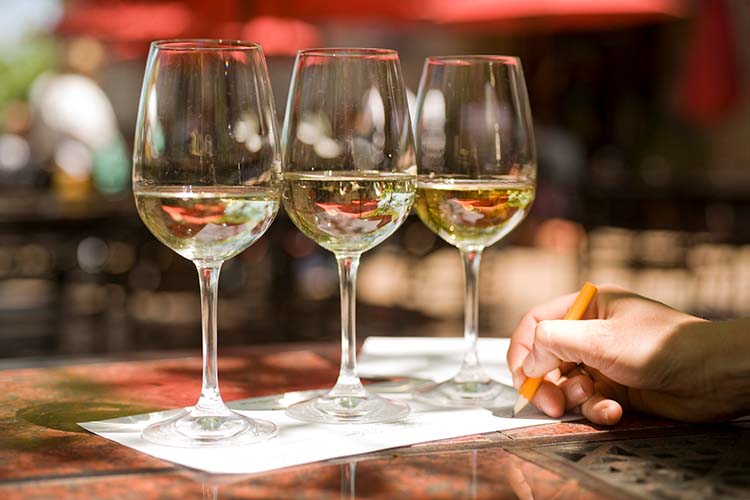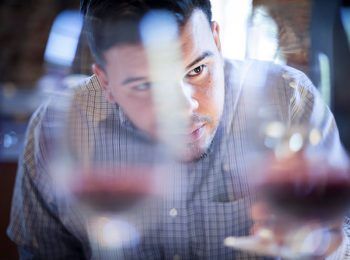 Faculty Spotlight: Professor of Wine and Beverage Studies Christie Dufault, named “great Wine Mentor” by Wine & Spirits magazine, explains how this program blends wine knowledge and tasting skills.
Faculty Spotlight: Professor of Wine and Beverage Studies Christie Dufault, named “great Wine Mentor” by Wine & Spirits magazine, explains how this program blends wine knowledge and tasting skills.

Unique Format
The Culinary Institute of America is dedicated to the modern educational needs of today’s master’s student, which is why the 75-year-old college has in the last couple of years moved its advanced wine studies to a largely virtual format. Our master’s degree in Wine and Beverage Management is a thorough two-year endeavor that occurs largely asynchronously online and is book-ended by in-person residencies in world-renown wine regions in Napa Valley and Hudson Valley. This innovation allows students to complete their sensorial learning and earn an accredited master’s of wines degrees while continuing their work and personal lives.
While online learning is common and ubiquitous nowadays, it hasn’t quite permeated the world of wines education. But the wine master’s degree at CIA offers online learning in a one-of-a-kind format—via home-delivered premium wine kits. These wine kits are comprised of 24–36 benchmark teaching wines per semester, in tasting-sized bottles designed for educational purposes.
Sensory Analysis
These wines, carefully selected by CIA’s professional wines faculty, align with specific course contents and curriculum. For example, in the course Wine Regions of Northern Europe, learners will receive a kit with classic wines from France, Germany, Austria, and Hungary. Every wine kit comes with directions and a tasting grid to set up for the tastings. The bottles are numbered and labelled, but the labels are covered with a peel-away sticker. This encourages students to taste “blind,” not knowing what the wine is until after they have tasted it. This is a method of learning to identify wines accurately and analytically without the pre-bias of knowing what the wine is.
Because students learn how to taste analytically at the first residency in Napa Valley, they possess the skills to continue to taste independently as they move through the program virtually. But online doesn’t mean alone: learners in the virtual program are all members of a vibrant cohort and are encouraged and welcomed to set up tastings with their classmates either in person or virtually.
Wine tasting is often referred to as Sensory Analysis. Experienced tasters know that we engage all five of our human senses when we taste wine. We look carefully at its visual characteristics to acknowledge its hues, color, and clarity. We smell its myriad aromas when we put our noses to the wine. We taste it and endeavor to describe the flavors it embodies. We feel the wine on our palates and describe the tactile sensation or texture of the wine. And finally, we make use of the fifth sense—our sense of hearing. We need to listen to multiple voices. First, we need to listen to what the wine is telling us. If we are tasting with others, we listen to their comments and we learn more when we share and exchange with other tasters. Finally, we must learn to trust and to listen to our own inner voices when we are blind tasting. The more we taste, the more we train and develop a valuable skill. That skill needs to be nourished and built upon.
Expanded Knowledge
When we understand the theoretical approaches to wine, namely viticulture and viniculture, we develop a large vocabulary to describe wines. The more we study and the more we taste, the two approaches meld together, and we are in possession of a distinct wine lexicon and a large comprehensive body of knowledge. For those that appreciate wine, arriving at a place where wine knowledge and tasting skills are advanced can be one of the most redeeming parts of studying a topic as enormous as wine. After all, with millions of new wines every year, vintage after vintage, there is always more to learn about in the vast and ever-changing world of wine.
Our students at the Culinary Institute of America have the best of both worlds. They can earn their master’s degree remotely and conduct advanced virtual tastings, and they have the opportunity to learn in-person in Napa Valley and Hyde Park. In both cases, they will surely learn a lot.
Ready to take the next step? Apply today!



